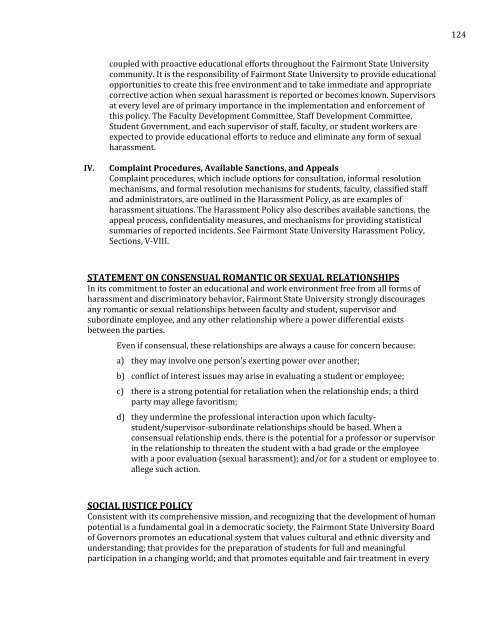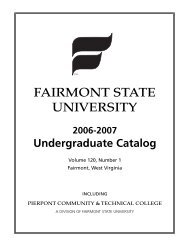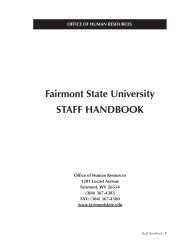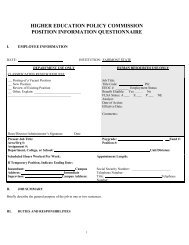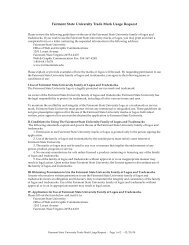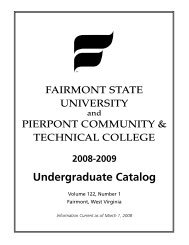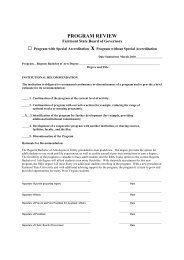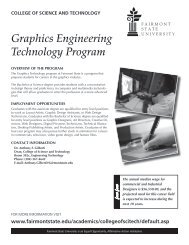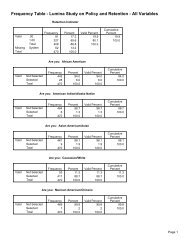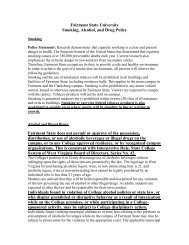Faculty Handbook - Fairmont State University
Faculty Handbook - Fairmont State University
Faculty Handbook - Fairmont State University
Create successful ePaper yourself
Turn your PDF publications into a flip-book with our unique Google optimized e-Paper software.
124<br />
coupled with proactive educational efforts throughout the <strong>Fairmont</strong> <strong>State</strong> <strong>University</strong><br />
community. It is the responsibility of <strong>Fairmont</strong> <strong>State</strong> <strong>University</strong> to provide educational<br />
opportunities to create this free environment and to take immediate and appropriate<br />
corrective action when sexual harassment is reported or becomes known. Supervisors<br />
at every level are of primary importance in the implementation and enforcement of<br />
this policy. The <strong>Faculty</strong> Development Committee, Staff Development Committee,<br />
Student Government, and each supervisor of staff, faculty, or student workers are<br />
expected to provide educational efforts to reduce and eliminate any form of sexual<br />
harassment.<br />
IV.<br />
Complaint Procedures, Available Sanctions, and Appeals<br />
Complaint procedures, which include options for consultation, informal resolution<br />
mechanisms, and formal resolution mechanisms for students, faculty, classified staff<br />
and administrators, are outlined in the Harassment Policy, as are examples of<br />
harassment situations. The Harassment Policy also describes available sanctions, the<br />
appeal process, confidentiality measures, and mechanisms for providing statistical<br />
summaries of reported incidents. See <strong>Fairmont</strong> <strong>State</strong> <strong>University</strong> Harassment Policy,<br />
Sections, V-VIII.<br />
STATEMENT ON CONSENSUAL ROMANTIC OR SEXUAL RELATIONSHIPS<br />
In its commitment to foster an educational and work environment free from all forms of<br />
harassment and discriminatory behavior, <strong>Fairmont</strong> <strong>State</strong> <strong>University</strong> strongly discourages<br />
any romantic or sexual relationships between faculty and student, supervisor and<br />
subordinate employee, and any other relationship where a power differential exists<br />
between the parties.<br />
Even if consensual, these relationships are always a cause for concern because:<br />
a) they may involve one person's exerting power over another;<br />
b) conflict of interest issues may arise in evaluating a student or employee;<br />
c) there is a strong potential for retaliation when the relationship ends; a third<br />
party may allege favoritism;<br />
d) they undermine the professional interaction upon which facultystudent/supervisor-subordinate<br />
relationships should be based. When a<br />
consensual relationship ends, there is the potential for a professor or supervisor<br />
in the relationship to threaten the student with a bad grade or the employee<br />
with a poor evaluation (sexual harassment); and/or for a student or employee to<br />
allege such action.<br />
SOCIAL JUSTICE POLICY<br />
Consistent with its comprehensive mission, and recognizing that the development of human<br />
potential is a fundamental goal in a democratic society, the <strong>Fairmont</strong> <strong>State</strong> <strong>University</strong> Board<br />
of Governors promotes an educational system that values cultural and ethnic diversity and<br />
understanding; that provides for the preparation of students for full and meaningful<br />
participation in a changing world; and that promotes equitable and fair treatment in every


